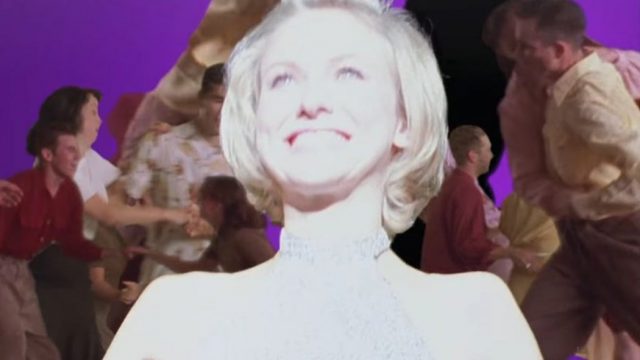It begins with an accident. A car accident. One that shatters the identity of an unknown woman (Laura Elena Harring) and ripples through the seductive, nightmarish world of Los Angeles. It’s a world built entirely from the archetypes and tropes of film noir, showbiz pulp, and ‘star is born’ melodramas. The bubbly ingenue (Naomi Watts) looking to make it as both a great actress and a movie star? Sure! The hotshot director (Justin Theroux) battling for control over his cinematic vision? Indeed!
But in the surreal world of David Lynch, nothing is ever so simple. What starts as a mystery slowly blossoms into a romance, then a horror film, and finally wilts into a tragedy.
It’s… a love story in the city of dreams.
No film has moved me quite like Mulholland Drive. Those who know me know it’s not only my choice for Lynch’s magnum opus, but my favorite film of all time. I could continue listing the praise: Watts’ extraordinary performance is the best I’ve seen, the film has rightfully been championed as the greatest film thus far in the 21st century by numerous critics and film organisations, how its puzzle box nature continues to enchant viewers who offer numerous explanations for what the film means. This isn’t even covering other aspects, like Mary Sweeney’s pitch-perfect editing or Angelo Badalamenti’s lyrical, haunting score.
But that feels more like an autopsy. The best films have that magic that tie them so deeply to who we are as cinephiles, pop culture enthusiasts, and people. To dissect them is like trying to perform self-surgery. It’s just best to avoid it as much as possible (unless it’s part of an academic paper, in which case, go nuts).
I was fifteen when I first saw Mulholland Drive. I had heard of the film for a while and I was already familiar with Lynch’s beautiful-grotesque nightmare vision. Nothing quite prepared me for what he dreamed up with Mulholland Drive. After I saw it I was, as the dusty old cliche goes, completely awestruck. Not only by the sheer imagination of the narrative, the magnificent central performance from Watts (her collaborations with Lynch deserve to be remembered in cinema/TV history), or the fact that I immediately wanted to watch again and again and again. Not only for the way he made idealised fantasy seem like reality and reality seem like a harrowing, disorienting fantasy.
In the ultimate paradox, Lynch’s burning cinematic cocktail of love, obsession, misery, jealousy, and revenge was the strangest ‘hopeful’ film I had seen.
I was still deeply closeted at fifteen, although many suspected I wasn’t straight. Like many others I was acutely aware that my ‘fate,’ if films and TV shows were any indicator, would probably be death through disease or violence, a life wracked by loneliness and obsession, or being the sidekick to a straight person. Perhaps my demise would teach them tolerance as well!
Mulholland Drive is a heartbreaking tragedy. But the tragedy unfolds organically; it’s not communicated from the first frame, nor is a result of the lead character(s)’ queerness. Tied to it, yes. A result, no. That fact, the fact that labels like ‘gay,’ ‘bi,’ ‘lesbian,’ don’t exist in this Lynchian world, and the idea that passionate love and sex can stem from a goodnight kiss as Angelo Badalamenti’s score swells in the background… all of that seemed groundbreaking and wonderful. I was not a happy teen, so the idea that my life could be tragic, but not because of the types of people I was attracted to — that felt bizarrely empowering. It made me realise I need not feel ashamed of my feelings or attractions. It made me feel I could just be, like Betty/Diane or Rita/Camilla. That the sexuality of film’s characters was just another part of the story, that it was the most normal part of the film, that was life-changing.
From the moment I saw it, I felt a kinship with the Betty/Diane characters, both played by Watts. It is a testimony to her talent that with her performances she makes broadness and subtlety look so intertwined as to be indistinguishable. Betty is pure sunny optimism; Diane is depression and rage personified. But both feel human, even at their most extreme. The whole world seems laid out on a silver platter for Betty; unspeakable tragedy and humiliation lie behind every corner for Diane. Through the years, I have gone through my Betty stages and my Diane chapters. I like to think everyone has. Those moments haven’t stopped and I doubt they will until I die.
In that sense, Mulholland Drive has served as a valuable roadmap for me. The world may be filled with terrible grotesqueries, crushing disappointment, and the erratic pacing of a frightening nightmare. But moments of love, optimism, the idea that success and happiness is possible, those all exist as well, even if they don’t last long. Perhaps Diane is Betty after too many years of disappointment and mistreatment. Perhaps Betty was nothing more than an impossible ideal, an exaggerated form of what may have been more modest hopes and dreams.
It’s just one of many mysteries the film leaves the viewer to consider. However, I do believe the film presents one ideal in both its ‘dream’ world and ‘real’ world: the possibility that in a dark, surreal universe, the journey itself can be eye-opening and awe-inspiring.
As I get older, I realise that to say I lived an interesting life ultimately means more to say I lived a happy one, even if I hope I can say, right before I die, that I was more happy than unhappy.
Mulholland Drive gave me that hope. Whether I ended up being more of a Betty or more of a Diane didn’t matter. I want a life as vibrant, moving, and mysterious as the film itself.
A person can dream…


